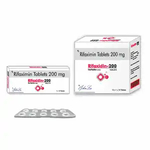ibifix
Introduction to ibifix
Ibifix is a medication primarily used to treat certain gastrointestinal conditions. It is known for its effectiveness in managing symptoms related to bacterial infections in the gut. This medicine is particularly useful for conditions like traveler's diarrhea and irritable bowel syndrome with diarrhea (IBSD).
Composition of ibifix
Ibifix contains the active ingredient Rifaximin, which is an antibiotic that works by inhibiting bacterial RNA synthesis. This action prevents the growth and replication of bacteria in the gut, making it effective for gut-specific infections.
Uses of ibifix
- Treatment of traveler's diarrhea caused by E. coli
- Management of irritable bowel syndrome with diarrhea (IBSD)
- Prevention of hepatic encephalopathy
- Off-label use for small intestinal bacterial overgrowth (SIBO)
- Off-label use for C. difficile-associated diarrhea
Side effects of ibifix
Common side effects:
- Headache
- Nausea
- Abdominal pain
- Diarrhea
Serious side effects:
- Allergic reactions
- Liver dysfunction
- Clostridium difficile-associated diarrhea
Precautions of ibifix
Before taking ibifix, it is important to inform your healthcare provider if you have a history of liver disease. This medication is not recommended for individuals with hypersensitivity to rifaximin or any component of the formulation. Pregnant or breastfeeding women should consult a healthcare provider before use. It is also not suitable for treating systemic infections.
How to Take ibifix
- For traveler's diarrhea: 200 mg three times a day for 3 days
- For IBSD: 550 mg three times a day for 14 days
- For hepatic encephalopathy: 550 mg twice a day for long-term use
- Ibifix is taken orally, with or without food
Conclusion of ibifix
Ibifix is a valuable medication for treating specific gastrointestinal conditions. Its ability to target gut-specific infections makes it a preferred choice for many patients. However, it is crucial to use it under medical supervision, especially if you have underlying health conditions or are pregnant or breastfeeding. Always follow the prescribed dosage and consult your healthcare provider for any concerns.
Similar Medicines
Available in 2 variations

Ibifix 200 Tablet
Ibifix 200 Tablet
strip of 10 tablets

Ibifix 400 Tablet
Ibifix 400 Tablet
strip of 10 tablets
Related Faqs

Can Rifagut cure IBS?
Taking Rifagut can help improve the symptoms and delay the recurrence of the disease. However, it is not sure whether it will cure the disease completely or not. It has been shown that Rifagut can help improve the symptoms such as diarrhea, abdominal pain and discomfort. Consult your doctor for exact details on the treatment of IBS.

What does Rifigon do for the liver?
In liver disease, there is an increased growth of bacteria in the intestine which increases the load of toxins travelling through the body. This further increases the possibility of toxins reaching the brain which can cause abnormal brain function. Rifigon slows down the growth of bacteria in the gut, decreasing the symptoms in cases of liver disease.

Can Rifagen cure IBS?
Taking Rifagen can help improve the symptoms and delay the recurrence of the disease. However, it is not sure whether it will cure the disease completely or not. It has been shown that Rifagen can help improve the symptoms such as diarrhea, abdominal pain and discomfort. Consult your doctor for exact details on the treatment of IBS.

How long does Rifaxia take to work for IBS?
Rifaxia usually starts acting within 24 to 48 hours. The symptoms like diarrhea improve gradually after you start taking this medication. Usually, taking Rifaxia for 2 weeks relieves the symptoms of IBS. Moreover, it has also been seen that this 2-week course of Rifaxia provides relief for up to 10 weeks even after stopping the medication.
Related Posts

1:15
How Do You Know If You Have a Vaginal Infection? Warning Signs!

1:15
Top Health Benefits of Cinnamon | How to Use It for Better Health!

1:15
Is Your Blood Pressure Too Low? What Are the Best Remedies to Fix Low Blood Pressure Instantly?

1:15
Mala D: How it works, When and How to take Mala D and Side Effects of Mala D!

1:15
Reduce Inflammation Naturally: Best Foods for Heart, Diabetes & Overall Health!
Disclaimer : This information is not a substitute for medical advice. Consult your healthcare provider before making any changes to your treatment . Do not ignore or delay professional medical advice based on anything you have seen or read on Medwiki.
ibifix
Prescription Required
Manufacturer :
Indiabulls pharmaceutical ltdComposition :

















.svg)
